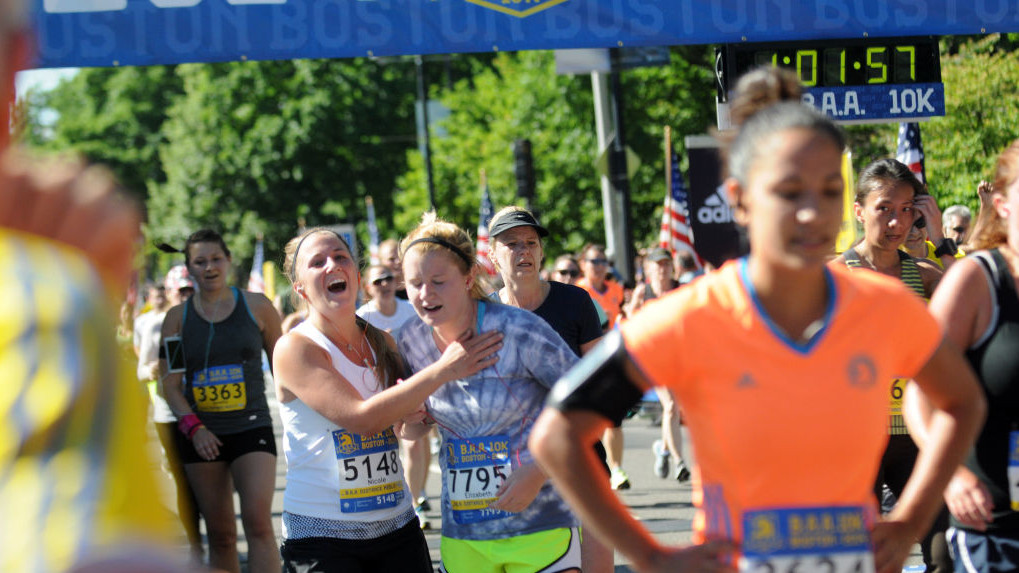
There’s a reason 10K is such a common distance for mass-participation road races. It’s an achievable next step for people who have caught the running bug after successfully completing a couch to 5K plan, and 10K training plans are also a great way for seasoned runners to improve their speed endurance. If you’re already running regularly, you don’t need to commit to long marathon or half marathon training plans.
Once you’ve signed up for an event, it’s wise to choose a target time so you can select an appropriate training plan and adjust the pace in each type of training run accordingly. It also means you can put yourself in the correct start wave on race day.
To help you work out what time to shoot for we looked at data held by RunRepeat and Running Level to identify the average 10K race times.
What is the average 10K time?
Running Level holds data from 50 competitive UK races between 2016 and 2020. It calculates a good 10K time as 49min 43sec, defining “good” as the average across all ages and genders.
RunRepeat works out its averages from 35 million race results covering four distances (5K, 10K, half marathon and marathon) but doesn’t specify how many 10K results it bases its calculations on. It reports that 1hr 2min 8sec is the average 10K time.
What is a good 10K time for a man?
According to Running Level’s analysis of competitive UK races, the average 10K time for a man was 46min 43sec.
RunRepeat’s average is slower, indicating that the average man takes 57min 15 sec to finish.
What is a good 10K time for a woman?
Running Level found that 54min 13sec was the average time it took women to complete a 10K in the UK races it looked at.
RunRepeat, looking at a different data set, put the average 10K time for women at 1hr 6min 54sec.
What is the average 10K time by age?
Running Level splits up 10K times by age but each age group is split into beginner, novice, intermediate, advanced and elite categories. We combined these times to work out the average. Go to Running Level’s page to see which category you fall into and the average time for your age and category.
What is a good elite 10K time?
An elite 10K is run on the track and isn’t comparable to the road races amateur runners take part in. But in case you were wondering, the men’s outdoor 10,000 meters world record is 26min 1sec, set by Ugandan Joshua Cheptegi in October 2020. The women’s world record is held by Ethiopian Letesenbet Gidey, who ran 29min 1.03 sec in June 2021.
What 10K time should I be aiming for?
If you’ve completed a 5K before, use our running pace charts to work out your per-mile pace, then aim for a 10K race pace between 10 and 30 seconds slower per mile.
If you’ve already raced a 10K and have been consistent with your running, maintaining your level of fitness since the race, a good starting point is 30 seconds faster than your current best time.
10K Pace Chart
What is a good 10K time for me?
If you’re an experienced runner and looking to work out a goal 10K time to train towards, then it starts with working out what your 5K pace should be. You can use a recent 5K time or try this workout suggested by Arj Thiruchelvam, running coach and founder of Performance Physique, which is great for showing what your 5K pace is.
“It’s an old track session, six by 1K,” says Thiruchelvam. “You do six one kilometer reps, with 90 seconds rest in between. Then you average out the pace of the reps to find your 5K pace.”
Once you have your 5K pace and target time, Thiruchelvam says you can use this to get a rough estimate of your 10K time.
“10K follows suit, roughly,” says Thiruchelvam. “You just add a bit on, around a minute [to the total time]. You're working in the same energy system.The difference being that realistically you're not just going to double it plus one minute, it's going to be a little bit longer than that because it’s based on your ability to tolerate the horrendous pain through your legs. The more experienced you become, the closer that margin will get.”
So if your 5K time is 20 minutes, you can look at running a 10K in around 41-42 minutes, using interval workouts in your training to help you get better at holding your speed over a longer distance.







